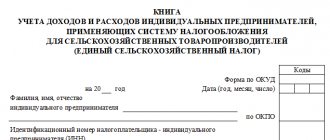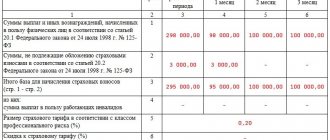The organization maintains accounting records throughout its life, and the manager is responsible for it, who usually entrusts this work to the chief accountant or contacts companies that provide accounting services (Part 3, Article 7 of the Federal Law of December 6, 2011 No. 402-FZ “On accounting"). If an institution has the right to use simplified methods of accounting, including the preparation of simplified accounting (financial) statements, or is a medium-sized enterprise, then the heads of such organizations can take over the accounting. Such a decision must be formalized by an order on maintaining accounting records. The sample order below for the appointment of the chief accountant of an LLC can also be used.
Why do you need a job description?
The activity of any organization begins with determining its structure (division into divisions, departments, workshops, blocks and the distribution of functions between them).
In addition, divisions are assigned responsibility for resolving issues related to the range of their tasks. At the same time, some functions may be placed under the jurisdiction of not 1, but 2 or several divisions or, conversely, not be placed under anyone’s control. To eliminate duplication of functions and the absence of those responsible for their implementation, as well as to ensure an unambiguous distribution of responsibilities between departments, the current structure of the organization and the main functions of the departments are fixed in an internal administrative document. Then the goals, objectives, functions, structure and procedure for interaction with other divisions of the legal entity are prescribed in the regulations for each division. The goal of the head of the organization (or the person appointed by him) when approving these documents is to control the completeness of the reflection of the functions performed by the unit and to eliminate their duplication.
The regulations on the unit, giving an idea of the amount of work that this unit will have to perform, serves as the basis for determining its staffing levels, establishing the qualification level and positions of the required employees, distributing responsibilities between them and developing their job descriptions. Including, it provides material for the job description of the head of the department.
The obligation to develop regulations on departments and job descriptions is not fixed at the legislative level. However, they significantly facilitate the life of the organization itself, bringing clarity to the distribution of tasks between departments and employees within them, as well as defining the circle of those responsible for resolving certain issues.
A job description developed for a specific position allows you to:
- define specific functions for this position and simplify the procedure for familiarization with them;
- facilitate the selection of personnel for vacant positions;
- familiarize the employee with his functions against signature, thereby securing him responsibility for their failure to perform them and his right to refuse to perform someone else’s work without additional payment;
- monitor the performance of a specific employee and the correct distribution of functions.
Instructions for a number of positions may be standard, but it is better to develop them for each organization independently and individually, based on the specifics of the activities of a particular legal entity, the characteristics of its industry, structure and delimitation of areas of responsibility between divisions. This document is given legal force by its approval by the head of the organization.
III. Job responsibilities
To perform the functions assigned to him, the chief accountant of the enterprise is obliged to:
3.1. Organize accounting of economic and financial activities and control over the economical use of material, labor and financial resources, and the safety of the enterprise’s property.
3.2. Formulate an accounting policy in accordance with accounting legislation, based on the structure and characteristics of the enterprise’s activities, the need to ensure its financial stability.
3.3. Organize accounting of property, liabilities and business transactions, incoming fixed assets, inventory and cash, execution of cost estimates, performance of work (services), results of financial and economic activities of the enterprise, as well as financial, settlement and credit transactions, timely reflection on accounting accounts of transactions related to their movement.
3.4. Monitor compliance with the procedure for preparing primary and accounting documents, settlements and payment obligations, spending the wage fund, conducting inventories of fixed assets, inventory and cash, checking the organization of accounting and reporting, as well as documentary audits in the divisions of the enterprise (branches ).
3.5. Take measures to prevent shortages, illegal spending of funds and inventory, violations of financial and economic legislation.
3.6. Ensure the legality, timeliness and correctness of the execution of documents, work (services) performed, payroll calculations, correct calculation and transfer of taxes and fees to the federal, regional and local budgets, insurance contributions to state extra-budgetary social funds, payments to banking institutions, funds for financing capital investments, repaying bank loan debts on time, as well as deductions for material incentives for enterprise employees.
3.7. Participate in the preparation of materials on shortages and thefts of funds and inventory items, control the transfer, if necessary, of these materials to investigative and judicial authorities.
3.8. Lead the work on the preparation and adoption of a working chart of accounts, forms of primary accounting documents used for registration of business transactions for which standard forms are not provided, development of forms of internal accounting documents, as well as ensuring the procedure for conducting inventories, monitoring the conduct of business transactions, compliance with technology processing of accounting information and document flow procedures.
3.9. Participate in conducting an economic analysis of the economic and financial activities of an enterprise based on accounting and reporting data in order to identify on-farm reserves, eliminate losses and unproductive costs.
3.10. Work to ensure strict compliance with staffing, financial and cash discipline, estimates of administrative, economic and other expenses, the legality of writing off shortages, accounts receivable and other losses from accounting accounts, the safety of accounting documents, their execution and delivery in the prescribed manner to the archive.
3.11. Take measures to accumulate financial resources to ensure the sustainability of the enterprise.
3.12. Ensure the rational organization of accounting and reporting at the enterprise on the basis of maximum centralization of accounting and computing work and the use of modern technical means and information technologies, progressive forms and methods of accounting and control, the formation and timely submission of complete and reliable accounting information about the activities of the enterprise, its property status , income and expenses, as well as the development and implementation of measures aimed at strengthening financial discipline.
3.13. Interact with banks on the placement of available funds on bank deposits (certificates) and the acquisition of highly liquid government securities, control over accounting transactions with deposit and loan agreements, securities.
3.14. Participate in the development and implementation of rational planning and accounting documentation, progressive forms and methods of accounting based on the use of modern computer technology.
3.15. Ensure the preparation of balance sheets and operational summary reports on income and expenses of funds, the use of the budget, other accounting and statistical reporting, and their submission in the prescribed manner to the relevant authorities.
3.16. Provide methodological assistance to employees of enterprise departments on accounting, control, and reporting issues.
3.17. Manage employees of the company's accounting department.
Possible options for the role of the chief accountant
The Law “On Accounting” dated December 6, 2011 No. 402-FZ assigns organizations the obligation to maintain accounting. It is allowed that accounting can be carried out (Article 7):
- the leader himself;
- attracted individual or legal entity;
- full-time chief accountant or other official.
Since accounting requires special knowledge, the specifics of the activities of a particular legal entity and prompt response to events occurring in it, most often these functions are assigned to the organization’s own employee, who is hired as a chief accountant. Mandatory requirements for it are set out in paragraph 4 of Art. 7 of Law No. 402-FZ:
- presence of higher or secondary specialized education;
- work experience in the field of accounting for at least 3 years out of the last 5 if you have a specialized education, and if not, at least 5 years out of the last 7;
- no outstanding convictions for economic crimes.
However, these requirements are mandatory only for chief accountants:
- in open joint-stock companies (except for credit institutions);
- insurance organizations and non-state pension funds;
- joint stock investment funds;
- management companies of mutual investment funds;
- other economic entities whose securities are admitted to circulation at organized trading (except for credit organizations);
- management bodies of state extra-budgetary funds.
For chief accountants of other economic entities, the above requirements are not mandatory.
You can find out more about what requirements for the qualifications of the chief accountant the new professional standard “Accountant” requires in ConsultantPlus. Get trial access to the system for free and go to the document.
Depending on the size of the organization, the chief accountant can work:
- As the only accountant. In this case, all accounting responsibilities fall on him. In small organizations, he usually also performs the functions of the personnel department.
- As part of a small accounting department. The chief accountant not only organizes and controls the work of the accounting department, but also performs part of the accounting work himself, just like ordinary accountants.
- As part of a large accounting service, one of the responsibilities of which is a significant amount of additional reporting and explanations presented both to the legal entity’s own divisions and to external users (owners, management structures, banks, counterparties, Federal Tax Service). In this case, control over the correct execution of accounting operations by accounting employees, preparation of reports and responses to requests becomes dominant for the chief accountant.
- As part of the accounting department, some of the functions of which are transferred to other divisions. In this case, the determining tasks for the chief accountant will be organizing the timely receipt of information, monitoring its quality and linking data.
Thus, the functions of the chief accountant largely depend on many specific conditions of the organization of which he is an employee, and the scope of his responsibilities may vary. In this regard, they need to be clearly defined in the job description of the chief accountant.
Destination Features
The Labor Code pays special attention to such positions. For example, it determines the special conditions for concluding an employment contract with him. In accordance with Art. 59 of the Labor Code of the Russian Federation, with the chief accountants of organizations of any form of ownership, by agreement of the parties, a fixed-term employment contract can be concluded, and the probationary period (Article 70 of the Labor Code of the Russian Federation) for them can last 6 months, if there are no restrictions.
When hiring an accountant or registering a transfer from another position, you need to issue an Order for Hiring or Transfer. As a rule, in this case, unified forms No. T-1 and No. T-5 are used. In some institutions, an order is additionally drawn up for the appointment of a chief accountant. It seems that the issuance of such an order was caused by the excessive bureaucratic requirements of some banks and electronic platforms, since, in essence, this document repeats the information contained in personnel orders and has no additional value.
Main tasks of the chief accountant
Regardless of the size of the organization of which he is an employee, the chief accountant belongs to the category of managers. He must have certain knowledge and perform a number of functions required for the position. These requirements for him are given in the Qualification Directory of Positions of Managers, Specialists and Other Employees, approved by Decree of the Ministry of Labor of the Russian Federation dated August 21, 1998 No. 37, and the professional standard “Accountant” approved by Order of the Ministry of Labor of the Russian Federation dated December 22, 2014 No. 1061n.
The professional standard is mandatory only for accountants of state and municipal institutions and organizations with a state share of more than 50% (Clause 1, Article 4 of the Law “On Amendments to the Labor Code...” dated 05/02/2015 No. 122-FZ) from 07/01/2016. Other organizations may be guided by its requirements, but have the right not to use it.
The knowledge portion of these documents lists:
- legislation on accounting, including issues of organizing accounting, rules for its maintenance, reporting;
- tax law;
- civil, financial and economic legislation;
- labor law;
- codes of ethics for professional accountants and corporate governance;
- statistical and management accounting;
- specifics, technology, structure, strategy and prospects for the organization;
- audit rules;
- methods of financial analysis of economic activity;
- accounting and reference legal databases.
The main functions of the chief accountant are provided by the Qualification Directory:
- organizing optimal accounting, including document flow, accounting work and development of accounting policies;
Read about what you need to pay attention to when developing an accounting policy in the article “ Drawing up a statement of accounting policies in an organization .
- compliance of transactions recorded by accounting with the requirements of current legislation;
- compiling all types of required reporting and meeting deadlines for its submission;
- correct calculation of taxes, insurance premiums and other charges;
- timely transfer of all necessary payments;
- participation in the formation of tax policy and financial analysis of activities;
- methodological assistance to other employees of the organization in matters of accounting and financial analysis.
Note that the main function of the chief accountant in the professional standard is the preparation of reports (Article 3.2 of the Accountant standard), however, the labor actions related to this position include all those listed for the chief accountant in the Qualification Directory .
The serious role of the chief accountant in an enterprise also implies increased responsibility. Which one you can find out in ConsultantPlus by getting free trial access to the system.
What should education be like?
According to the requirements specified in the qualification directory, a higher specialized education (economic or financial) is required for a chief accountant, that is, a diploma with a specialist or master's degree, as well as work experience of at least 5 years. This is due to the fact that the chief accountant must not only have deep professional knowledge, but also experience in solving non-standard issues and situations. A good specialist needs knowledge of all the intricacies of financial and labor legislation, taxation, economic activity, as well as the ability to optimize the costs of an enterprise so that there are no claims against it from the fiscal authorities.
Synergy University offers those wishing to work as an accountant specialized training leading to a master's degree upon completion of the course. Students receive in-depth knowledge of economics, accounting and finance, as well as practical skills for working in management positions. To enroll, you must present the admissions committee with a diploma of higher education and pass testing in your chosen field of study. The duration of training is 2 years.
Problems of Ch. accountant of a small company (LLC, JSC)
Features of the work of a chief accountant in a small organization include:
- absolute interchangeability of accounting staff, the need to be able to do everything yourself;
- the possibility of reducing the volume of accounting work and reporting through the use of special regimes or the use of concessions provided by the SMP;
- little demand for accounting data for financial analysis purposes;
- no need for a large number of additional forms of internal reporting;
- lack of demand for audits;
- lack of close attention from inspection authorities, a relatively small number of requests for clarification.
IV. Rights
The chief accountant has the right:
4.1. Represent the interests of the enterprise in relations with other structural divisions of the enterprise and other organizations on financial, economic and other issues.
4.2. Establish job responsibilities for employees subordinate to him, so that each employee knows the range of his duties and is responsible for their implementation. Employees of other departments involved in accounting report to the chief accountant on all issues of organization and maintenance of accounting and reporting.
4.3. Submit proposals for improving economic and financial activities for consideration by the management of the enterprise.
4.4. Sign and endorse documents within your competence.
4.5. Receive in a timely manner from the heads of the enterprise departments (specialists) information and documents (orders, instructions, contracts, estimates, reports, standards, etc.) necessary to perform their job duties. (For untimely, poor-quality execution and preparation of these documents, delay in transferring them for reflection in accounting and reporting, for the unreliability of the data contained in the documents, as well as for the preparation of documents reflecting illegal transactions, the officials who compiled and signed these documents are responsible ).
4.6. Submit for consideration by the director of the enterprise proposals on the appointment, relocation, dismissal of accounting employees, proposals for their encouragement or the imposition of penalties on them.
4.7. Involve specialists from departments of the enterprise in solving the tasks assigned to it (if this is provided for by the regulations on departments, if not, with the permission of the manager).
4.8. Require the director of the enterprise to provide assistance in the performance of his official duties and rights.
Functions of the chief accountant of a large enterprise
The chief accountant of a large enterprise has practically no opportunity to do actual accounting. The priorities in his work are:
- organization of an accounting scheme that covers in its full diversity all aspects of the enterprise’s activities;
- organization of complex document flow;
- development of an accounting policy that is significantly more detailed and voluminous than in a small legal entity;
- distribution of accounting functions among accountants, organization of their precise work, interaction and interchangeability;
- control and linkage of data used for the preparation of all types of reporting, including internal and statistical;
- generating reports as fully as possible using all forms of existing reports and drawing up the necessary explanations;
- calculation of a larger number of taxes, some of which are usually irrelevant for a small organization;
- mandatory participation in financial analysis and calculation of forecast data;
Read about methods for analyzing a financial results statement in the article “Methods for analyzing a profit and loss statement .
- working with inspectors during audits;
- a large amount of work in order to respond to various types of requests relating to accounting and taxation issues.
II. Functions
The chief accountant is assigned the following functions:
2.1. Management of accounting and reporting at the enterprise.
2.2. Formation of accounting policies with the development of measures for its implementation.
2.3. Providing methodological assistance to employees of enterprise departments on accounting, control and reporting issues.
2.4. Ensuring the preparation of salary calculations, accruals and transfers of taxes and fees to budgets of various levels, payments to banking institutions.
2.5. Identification of on-farm reserves, implementation of measures to eliminate losses and unproductive costs.
2.6. Introduction of modern technical means and information technologies.
2.7. Monitoring the timely and correct execution of accounting documentation.
2.8. Ensuring healthy and safe working conditions for subordinate performers, monitoring their compliance with the requirements of legislative and regulatory legal acts on labor protection.
Contents of the job description
Despite the significant difference between the texts of job descriptions that can be created for the chief accountant in a particular organization, its content consists of the same sections.
They are usually formed in the following sequence:
- requirements for qualifications (education, experience, knowledge);
- determining the place in the structure of the organization, the procedure for interaction with other employees;
- job responsibilities of the chief accountant;
- rights;
- responsibility.
Job Description Form
There is no strictly established form of job description, therefore it is developed and executed in the manner that applies to the preparation of such documents in the organization itself.
An indispensable condition for the entry into force of a job description is its approval by the head of the legal entity. It becomes mandatory for the employee from the moment he familiarizes himself with it and signs it.
You will find a sample job description for a chief accountant on our website.
Results
A job description is a fairly important document that defines the specific functions of an employee. Since the chief accountant is one of the serious figures in any organization, his job description should be given special attention.
Sources:
- Resolution of the Ministry of Labor of the Russian Federation dated August 21, 1998 No. 37
- Law “On Accounting” dated December 6, 2011 N 402-FZ
You can find more complete information on the topic in ConsultantPlus. Free trial access to the system for 2 days.
Responsibility of the chief accountant to the state
The chief accountant is responsible for his work not only to the employer, but also to the state. Let us consider in what cases such liability arises.
Administrative responsibility
If the chief accountant fails to fulfill professional duties or commits violations during their performance, he or she may be held administratively liable.
If his job description includes accounting and reporting as his duties, then cases of understatement of tax amounts by 10% or more will be considered a gross violation. If, according to the contract, the chief accountant is responsible for tax accounting and cash, he may be recognized as a violator for failure to provide (or untimely provision) of declarations or failure to comply with cash discipline. The maximum possible fine for detection of such types of offenses is 3 thousand rubles.
As in the situations discussed above, the court must determine the employee’s guilt and take into account the timing of the illegal actions. The Code of Administrative Offenses does not say who exactly should be punished for an administrative violation - the employer or the chief accountant. In each individual case, the issue is resolved individually.
Criminal liability
Criminal liability may arise for evasion of tax and insurance contributions. The chief accountant may be subject to this article if there is arrears under these articles on a large or especially large scale.
In the most severe cases, sanctions such as imprisonment for up to 6 years and the opportunity to hold certain positions for three years are applied. A person who has committed an illegal act for the first time can avoid criminal punishment by fully compensating the debt and paying penalties and fines.
It is quite difficult to bring the chief accountant to criminal liability, since it can be difficult to prove that he carried out illegal actions not for the purpose of evading taxation for personal gain, but due to insufficient professionalism, ordinary oversight, etc. Nevertheless, there are still precedents.
Here is just one case from judicial practice. The court accused the chief accountant of deliberately evading taxes on a large scale, proving the person’s personal interest. The chief accountant was able to convince the founder of the enterprise that the organization’s current account was frozen and proposed to temporarily use her personal account to ensure the continuity of the company’s activities. She also convinced him to sign blank sheets, where she later placed payment orders. Having the right of second signature, the accountant transferred the company’s money to her personal account. The defendant tried to justify herself, explaining that the transferred funds were later credited to the cash desk for the needs of the company. However, the witnesses did not admit this fact. The chief accountant was held accountable because the court proved the intentional nature of the illegal actions.



